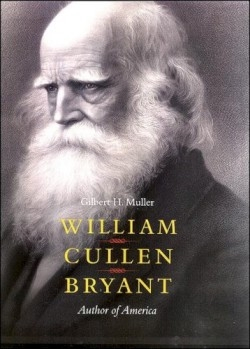William Cullen Bryant
Author of America
- 2008 INDIES Finalist
- Finalist, Biography (Adult Nonfiction)
In the tradition of poets who could make poetry pay—Byron, McKuen, Collins—William Cullen Bryant earned his place by having once been offered the princely sum of $1,000 in antebellum currency for any occasional verse he might compose. Best known as the author of “Thanatopsis” (published when he was twenty-three), “To a Waterfowl,” “The Prairies,” and other fine poems, Bryant was also one of America’s most illustrious public men. The editor of the successful and influential Evening Post and an ardent abolitionist, he was avidly pursued for autographs as he strolled the avenues. Bryant was an advocate for individual liberty—a Cicero who “helped define the trajectory of American culture and democracy.”
Gilbert H. Muller, now retired from City University of New York as professor emeritus of English, is a talented biographer, and his William Cullen Bryant: Author of America deftly traces Bryant’s transformation from a New England-trained lawyer to one of the nation’s leading editors and an elder statesman of American poetry with a transatlantic reputation. Like Ben Franklin, Bryant’s education was abbreviated by a reverse in the family finances, and he always saw journalism as an expedient from which he would someday return to his poetry.
“Cullen,” as he was called, was both an intellectual and physical phenomenon. To his last day he could recite perfectly his entire body of poetry. At age eighty-four, he still commuted to work on foot, six miles in all, and disdained the new fangled elevator for the nine flights of stairs to his office. Bryant was an exceptional naturalist with an impressive store of knowledge about the natural world, which at once connects and distinguishes him from the Romantic poets across the Atlantic. No revolutionary, Bryant was a lifelong Republican and supporter of Jackson’s Indian Removal policy. Bryant notoriously draws the vanishing Indian as already vanished: “A noble race! But they are gone, / With their old forest wide and deep.” And yet, not hypocritically, Bryant saw poetry as a moral force, and his meditations on death and war are some of the strongest of the century: “Again I turn to the woodlands / And shudder as I see / The mock-grape’s blood-red banner / Hung out on the cedar tree; / And I think of days of slaughter.”
William Cullen Bryant is less a critical biography of its subject than a large chapter of Americana spanning almost a century of tumultuous, nation-making events: the completion of the Erie Canal, the Amistad affair, the rise of New York City, and the Civil War. Never tedious, as even strong good biographies can be, Muller splendidly chronicles the nineteenth century, narrates a vivid New York story, and offers a compelling portrait of an American genius. The man whom James Fennimore Cooper called “the Author of America” deserves no less.
Reviewed by
Vince Brewton
Disclosure: This article is not an endorsement, but a review. The publisher of this book provided free copies of the book to have their book reviewed by a professional reviewer. No fee was paid by the publisher for this review. Foreword Reviews only recommends books that we love. Foreword Magazine, Inc. is disclosing this in accordance with the Federal Trade Commission’s 16 CFR, Part 255.

